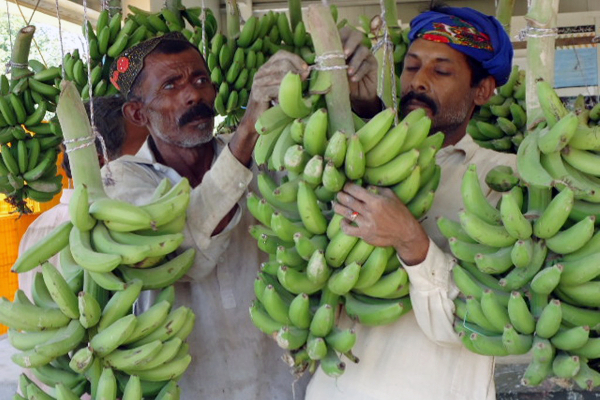
Improving Produce Quality with Banana Ripening Units and Process Training
In Pakistan, the Lasbela District is well suited for trade because of its close proximity to Karachi, the nation’s capital city. Roughly 46,000 tons of bananas are produced here annually, the highest production within the region of Balochistan. Unfortunately, much of the fruit intended for trade in Karachi return to Lasbela, because they are sold by commission agents unripened.
In order for farmers in Lasbela to take full advantage of their location and reduce post-harvest losses, they needed access to advanced farming facilities. The Winrock-implemented Pakistan Agriculture and Cold Chain Development (PACCD) project, funded by the U.S. Department of Agriculture, commissioned eight banana ripening rooms and sheds to improve the quality and marketability of produce.
The PACCD team gathered farmers to demonstrate the ripening process in the units. Two training sessions along with a ripening process demonstration were held at the newly established units. Before the trainings were held, the PACCD team distributed equipment (plastic field crates, bleach, knives, corrugated cartons and wooden pallets for the ripening units) for demonstrations on farms, so that farmers would be familiar with their use in the ripening process.
During the five-day training, workers and owners of the ripening units, as well as farmers from the surrounding area were trained on pre-cooling concepts, washing, grading, packing, and stacking of boxes on pallets. At both training sites, women packers participated and were trained on the whole banana ripening process, from picking to packing inside the ripening units.
On the fifth day of the training, when the bananas had ripened, representatives from the procurement department of Metro Cash & Carry were invited to inspect the first batch of bananas from the units. They offered to buy bananas at a price greater than market price and briefed the farmers on future requirements, and their acceptability criteria.
After meeting with the procurement representatives, farmers believe that the establishment of these eight banana ripening units will increase their bananas marketability and quality, ultimately increasing their future profits and incomes.
